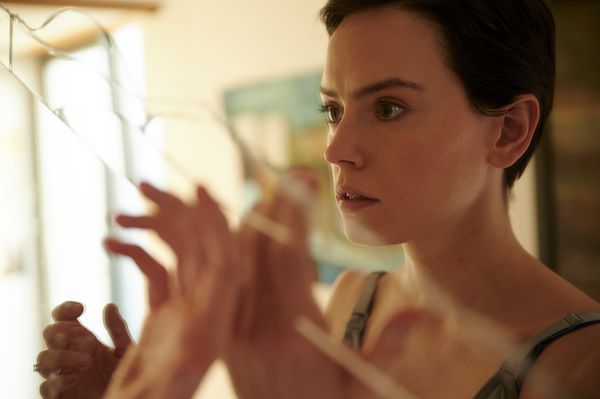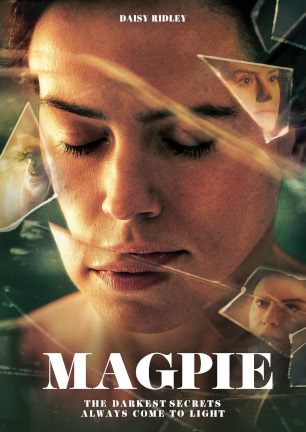Eye For Film >> Movies >> Magpie (2024) Film Review
Magpie
Reviewed by: Jennie Kermode

Most English speakers, upon encountering magpies, think first of the nursey rhyme One For Sorrow, Two For Joy, but European Magpie lore is much deeper and more expansive. Across much of the continent, it is considered unlucky to see a solitary bird of this kind, perhaps because they mate for life. In England, where Sam Yates’ thriller is set, such ill fortune might be avoided by greeting the magpie politely and asking after its spouse.
From the beginning, it is clear that Ben and Anette’s relationship is under strain. He (Shazad Latif) is preoccupied by the exciting business of their daughter Matilda’s developing film career. She (Daisy Ridley) is trying to get her career back on track after giving birth to their second child, Lucas. He doesn’t seem to recognise how important this is to her, only revealing at the last minute that a babysitter has cancelled, when she has an important meeting. For her part, she shows signs of mental instability, and there are hints that she may have suffered from this more severely in the past. Still, this kind of thing is not uncommon in families with young children, and people often succeed in working together to overcome it.

The question is, will they work together? The first alarm bell sounds when Anette finds Ben watching a sex tape featuring the lead actress from Matilda’s film. He’s angry about it, saying that it’s completely inappropriate to put a thing like that on the internet, and on set he calls out men who are joking about it – but is there more to his interest. When the actress, Alicia (Matilda Lutz) thanks him for his support, the two begin to grow close. Alicia immediately connects with Matilda and helps to look after her. They exchange numbers so that he can get a photo of the two together, and an exchange of text messages begins.
Nobody can altogether avoid falling in love – that’s a thing that can come out of the blue – but we can choose not to put ourselves in situations where it’s a risk, and we can certainly choose to avoid flirting. Increasingly, Ben indulges in the latter. He talks about his loneliness and how Anette never looks at him these days, whilst she applies the lipstick we can see her wearing in a photograph from when she was younger, hoping that he’ll notice her again. He begins to make excuses for his absences, even claiming to have started writing books again. She stares hard into the bathroom mirror, which abruptly cracks. Later, a crow smashes against one of the plate glass windows of the house, just behind her.
Who is the magpie? Is it Ben, chasing after shiny things? is it Alicia, so striking and different? Is it Anette, walking through the house with her forearms raised nervously, unconsciously imitating the movements of a baby bird? As Ben’s horizons expand, hers seems to grow smaller, but perhaps there’s more to her than he realises. Yates recognises Ridley’s skill with interiorised emotion and makes the most of it. Whereas Ben is often framed in midshots, objectified even as he seems to be the one with agency, Ridley gets lots of facial close-ups. It’s through these that we see the pressure building as we inch towards an explosive finale.
With inherent challenges where pacing is concerned, this is a difficult film to get right, and Yates is not entirely successful. It’s heavily contextual, and a gender switch might lead to it being read in a very different way. How much audiences will notice the ambiguous undercurrents in an apparently straightforward narrative remains to be seen, but will significantly affect what they take away. Still, it’s nicely played and worth a little patience. Bear in mind that the collective noun for magpies is a mischief.
Reviewed on: 10 Nov 2024
















